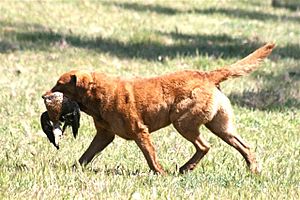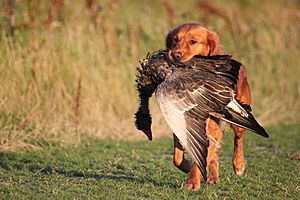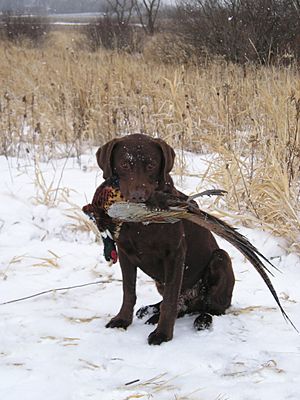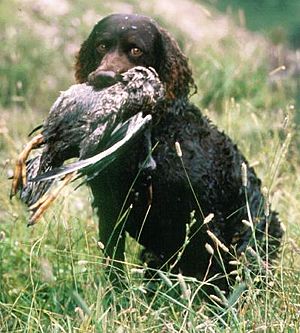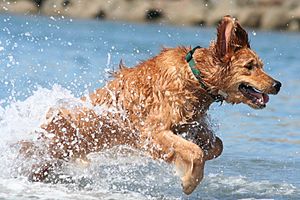Retriever facts for kids
A retriever is a special type of gun dog. These dogs are trained to find and bring back game, like birds, to a hunter. Gun dogs are usually split into three main groups: retrievers, flushing spaniels, and pointing breeds.
Retrievers were specifically bred to pick up birds or other prey and carry them back without causing any damage. Their main job is to retrieve things gently. Because of this, retriever breeds are known for having "soft mouths." This means they can hold game in their mouths without biting too hard. A dog with a "hard mouth" would damage the game, making it unusable.
Retrievers are also known for being eager to please, patient, and easy to train. This is why breeds like the Labrador Retriever and Golden Retriever are very popular as assistance dogs. They help people with disabilities. Their excellent reputation also makes them top choices for families and children around the world.
Contents
Amazing Retriever Skills
To be a great gun dog, a retriever needs to learn several important skills:
- Staying Calm (Steadiness): Retrievers are often used for waterfowl hunting, which means hunting birds near water. This often involves small boats in cold weather. Retrievers must learn to sit quietly and calmly until they are told to go. This "steadiness" is super important. It prevents the boat from tipping over or a gun from accidentally going off. A calm dog also helps the hunter aim better and remember where birds fall.
- Marking Downed Game: "Marking" is when the dog watches birds as they fall. When a hunter says "mark," the dog looks up for incoming birds. They try to remember exactly where each bird lands. Well-trained retrievers learn to follow the direction of the gun to see where the birds fall. Once the bird is down, the handler tells the dog to get it. A dog's ability to remember many "marks" is very important for hunting.
- Blind Retrieves: Sometimes, a dog might not see a bird fall. In these cases, retrievers are trained to follow commands from their handler. These commands can be hand signals, voice commands, or whistle sounds. This helps the dog find the downed game even if they didn't see it fall. This is called a "blind retrieve." Good teamwork between the dog and handler helps the dog find the bird quickly without disturbing the area too much.
- Bringing Game to Hand: Most hunters want the dog to bring the game directly to their hand. This means the dog holds the bird gently but firmly until the handler takes it. Bringing the bird "to hand" helps make sure a wounded bird doesn't escape. The bird stays safely in the dog's mouth until the hunter takes it.
- Honoring: When hunting with more than one dog, a retriever must stay calm while other dogs are working. They wait patiently for their turn. This is important because if all dogs try to get the game at once, it can cause confusion. This is why many handlers use a dog's name when telling them to retrieve.
- Shaking on Command: After getting a bird from the water, a well-trained dog will not shake off water until they are told to. If a dog shakes in a small boat, it could make the boat tip over in cold weather. It could also spray water all over the hunters and their gear. Also, shaking while holding a bird could damage it. To avoid these problems, trainers teach dogs a special command for when they can shake.
- Quartering: Retrievers can also help hunt birds on land, like pheasants. This is called "upland flushing." The dog walks in a zig-zag pattern in front of the hunter, looking for birds. The retriever must stay close enough so that when a bird flies up, it's still within the hunter's shooting range.
- Staying Steady to Wing and Shot: When hunting upland birds, the dog should sit down when a bird flies up or a gun is fired. This helps them remember where the bird fell. It also stops them from chasing a missed bird, which could scare away other birds nearby.
Important Traits for Working Retrievers
Even though most retrievers can be trained, breeders put a lot of thought into choosing dogs with specific traits. These traits make the training process much easier and create better working dogs. When breeding retrievers for hunting, these qualities are very important:
- Eager to Learn (Biddableness): Training a retriever takes a lot of time and effort. So, it's super important for the dog to be smart, easy to control, and willing to learn. A "biddable" retriever makes training much smoother.
- Desire and Drive: These traits describe a good retriever's strong eagerness. They show an almost crazy desire to retrieve things. They will even overcome big obstacles to get a bird. They also show a huge interest in birds, feathers, and bird smells. This is called "birdiness."
- Marking and Memory: Good eyesight and being able to judge distances are very important for a dog to mark where downed game falls. Remembering each fall is also key. While trainers use special methods to help dogs mark and remember, a good retriever is born with these natural abilities.
- Nose: Dogs rely mostly on their sense of smell. A good retriever uses its nose to find downed game hidden in thick bushes. They also use their nose when searching a field to find and flush out upland game birds.
- Soft Mouth: A dog with a soft mouth is needed to make sure the retrieved game is still good to eat. A soft-mouthed dog picks up and holds the game gently but firmly. Dogs that drop birds too often, chew on them, or even eat them before giving them to the handler are called "hard-mouthed." While training can fix most "mouth problems," a dog that naturally has a soft mouth is better when starting training.
- Toughness (Hardiness): Hunting waterfowl is a cold-weather sport. It happens in many different places and conditions. This can be in thick, flooded forests in the southern US, icy ponds in the Midwest, or freezing seas along the coast. A good retriever will happily go into the water again and again, making many retrieves even in these tough conditions.
Lifespan
Most retrievers live for about 10 to 12 years. Some can even live up to 15 years!
Retriever Breeds
- Chesapeake Bay Retriever
- Curly Coated Retriever
- Flat Coated Retriever
- Golden Retriever
- Labrador Retriever
- Nova Scotia Duck Tolling Retriever
Other Dogs with Retrieving Skills
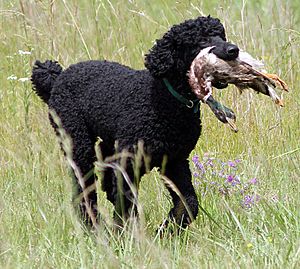
- American Cocker Spaniel
- American Water Spaniel
- Barbet
- Boykin Spaniel
- Blackmouth Cur
- Blue Lacy
- Brittany
- Clumber Spaniel
- Dutch Partridge Dog
- English Cocker Spaniel
- English Setter
- English Springer Spaniel
- Épagneul Bleu de Picardie
- Epagneul Pont-Audemer
- Frisian Pointer (stabyhoun/stabij)
- German Longhaired Pointer
- German Shorthaired Pointer
- German Wirehaired Pointer
- German Water Spaniel
- Gordon Setter
- Hungarian Vizsla
- Italian Spinone
- Irish Setter
- Irish Water Spaniel
- Newfoundland
- Pointer
- Poodle
- Portuguese Water Dog
- Spanish Water Dog
- Sussex Spaniel
- Tibetan Terrier
- Weimaraner
- Welsh Springer Spaniel
- Wire-haired Pointing Griffon
See also
 In Spanish: Perro cobrador para niños
In Spanish: Perro cobrador para niños
 | Bessie Coleman |
 | Spann Watson |
 | Jill E. Brown |
 | Sherman W. White |


